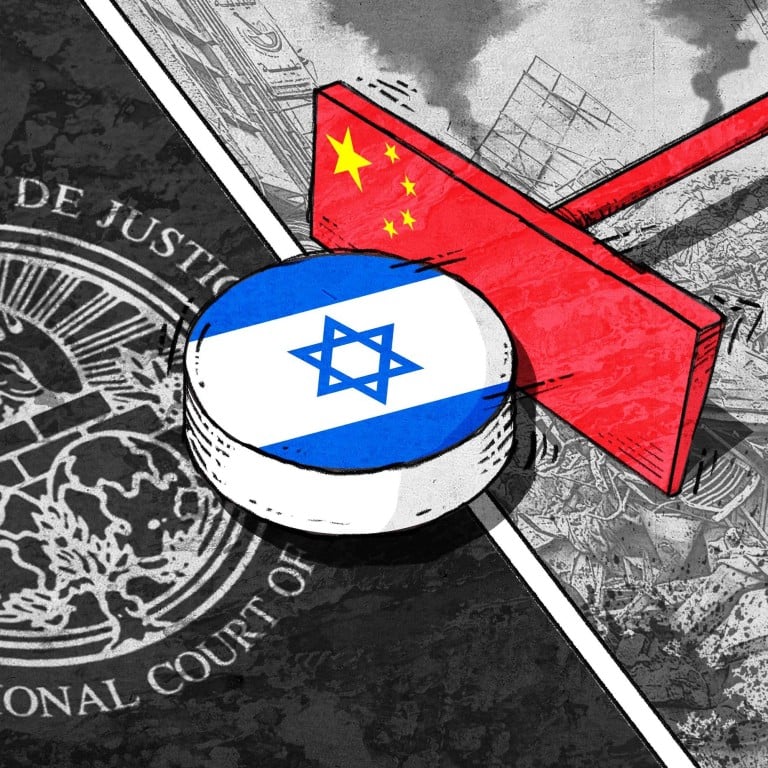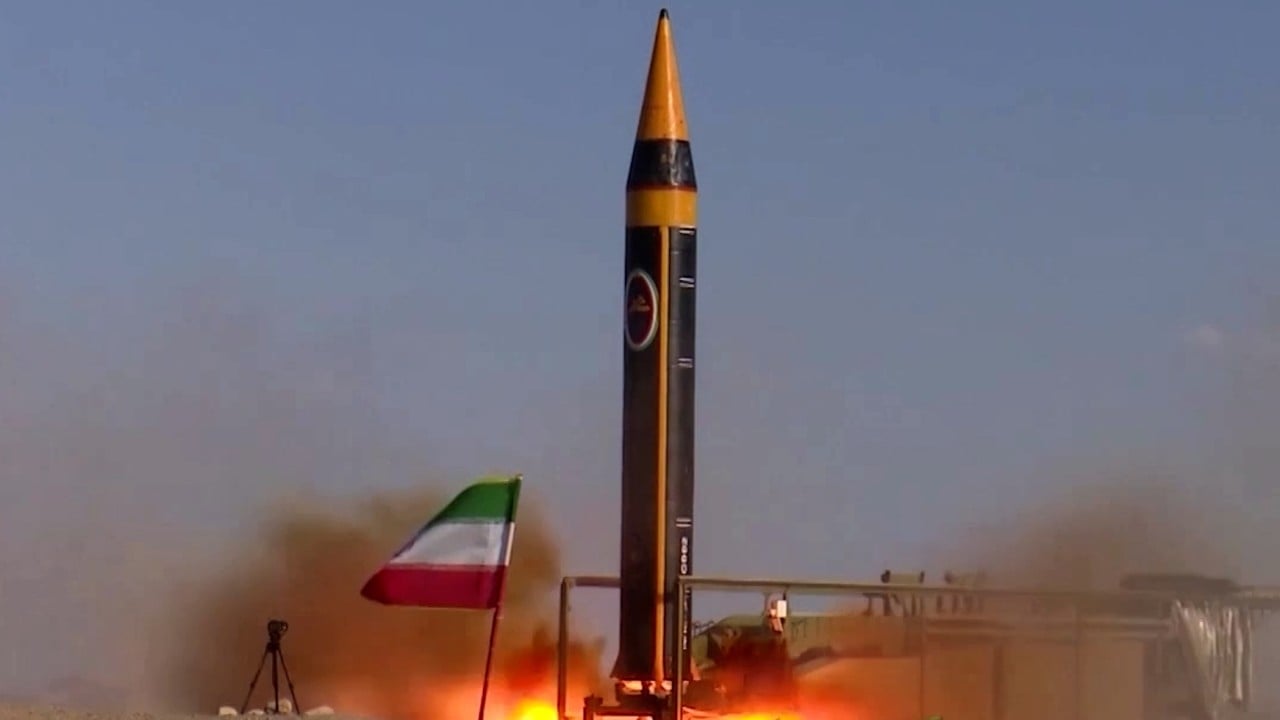
Why China’s words at top UN court could signal stronger support for Palestinian cause
- Chinese diplomat’s comments at ICJ appear to endorse armed struggle against Israel in what analyst calls an ‘unanticipated shift’ in stance
- However, others say comparisons between speech at World Court and Mao-era rhetoric are overstated, noting Beijing still favours a two-state solution
“In pursuit of the right to self-determination, Palestinian people’s use of force to resist foreign oppression and complete the establishment of an independent state is [an] inalienable right well founded in international law,” said Chinese foreign ministry legal adviser Ma Xinmin during the six-day hearings at the ICJ, where he also reiterated Beijing’s calls for a ceasefire.
China’s support for Palestinians may be seen as support for Hamas attack: Israel
“The Chinese discourse at the ICJ marked a departure, with China reverting to its historical position,” said Razan Shawamreh, a researcher focused on Chinese foreign policy at Eastern Mediterranean University in Cyprus. She added that Beijing’s endorsement of Palestinian armed struggle was an “unanticipated shift”.
Five months later, Ma’s speech at the ICJ showed solidarity with Palestinians, declaring that the fight for liberation and the right to self-determination – including “armed struggle against colonialism, occupation, aggression, domination against foreign forces” – should not be considered acts of terror.
Differences between Washington and Beijing on the issue boiled over in the United Nations Security Council on Friday, with China and Russia voting against a US-led resolution calling for an immediate ceasefire in Gaza as part of a hostage deal.
China’s UN ambassador Zhang Jun said that the US plan was unbalanced and criticised it for lacking explicit opposition to a planned military operation by Israel in Rafah in southern Gaza.
Past positions
In December, South Africa accused Israel of genocide at the International Court of Justice, also called the World Court, a 78-year-old UN organ located in The Hague, Netherlands that allows countries to bring forward cases against other states. The 193 UN members, including China, are automatically parties to the court.
On January 26, the court adopted “provisional measures”, or binding orders, requiring Israel to prevent genocide against Palestinians in Gaza, enable the provision of basic services and humanitarian aid, and prevent and punish incitement to commit genocide.
Shawamreh noted that China had consistently condemned the use of force by both sides since 1989, when Beijing put forward its first peace proposal addressing the Israeli-Palestinian conflict. In statements about Gaza made between 2008 and 2021, Beijing condemned all use of military force, which it called “acts of violence and hostility”.
Chinese envoy meets Hamas political leader in a first since the Israel-Gaza war
In 2003, Beijing even called on Yasser Arafat, then president of the Palestinian Authority, to take all necessary measures to halt Palestinian military operations against Israel, Shawamreh said.
Beijing’s echoing of Maoist rhetoric on fighting colonialism through armed struggle was viewed by Palestinians as “significant and required of a major power that has historically supported the Palestinian armed struggle with both financial and military aid”, Shawamreh said.
Sercan Caliskan, a researcher at the Centre for Middle Eastern Studies, a Turkish think tank, said that “Mao Zedong once compared Israel to Taiwan, describing it as one of the bases of imperialism in the [region]”. The Palestinian Liberation Organisation, on the other hand, opened an embassy in China in 1974, he added.
Beijing also supported a 1975 UN resolution that equated Zionism with racism.
China’s Middle East ties
But the historical ties between China and Palestine are not the main reason for the former’s more forceful support of the latter in recent months, which Caliskan argued was prompted by Beijing’s differences with Israel’s largest ally, Washington.
Additionally, China has grown closer to Iran – a long-time Palestinian ally that has supported militant group Hamas with weapons, funding, training and intelligence – as both Beijing and Tehran are under pressure from US sanctions.
China, Iran and Russia concluded a joint maritime exercise in the Gulf of Oman last Friday.
In his speech at the ICJ hearing, Ma said that Israel’s practices and policies of oppression had “severely undermined and impeded the exercise and full realisation of the Palestinian people’s right to self-determination”.
Caliskan said those comments, which marked “one of the most critical changes” in Beijing’s approach, had “brought its pro-Palestinian stance to a level that puts relations with Israel at risk” and “positioned Israel on the opposite front”, with bilateral relations bound to deteriorate.
“At the very least, Israel can be expected to review existing and planned investment agreements with Chinese companies such as Huawei,” said Caliskan. The telecommunications equipment giant has rapidly expanded its operations in Israel in recent years, including opening a research and development facility.
China repeats call for Gaza ceasefire, peace talks on Middle East and Ukraine
“China engages with interstate tensions and conflicts in the Middle East more sharply than ever before and its policy will not compromise on defending the rights of Palestinians,” Caliskan said.
“Beijing not only increased its support for Palestine on a discursive basis but also revealed that it had hardened its views on the [two-state] solution path by declaring that it supports the military steps taken by the Palestinian people on the ground.”
Milder than Mao
According to William Figueroa, an assistant professor of history and international relations theory at the University of Groningen in the Netherlands, Ma’s speech at the ICJ was consistent with China’s long-held position in favour of a two-state solution and did not show the capacity to “rein in Israel”.
“China has more or less implicitly taken this stance by attributing the root cause to Israeli oppression and refusing to condemn Hamas as a terrorist organisation,” said Figueroa, who specialises in China-Middle East relations.
The UN has not designated Hamas – the Gaza Strip’s other governing force, alongside the Palestinian Authority – as a terrorist organisation.
To say that Ma’s statements were milder than Mao’s position would be a “serious understatement”, according to Figueroa.
“During the Mao era, China condemned Israel as a racist settler-colonial entity, supported a one-state solution with Palestine as the one state, and supported the Palestine Liberation Organisation, which had carried out attacks against civilians,” Figueroa said.
Could China play a role in brokering Israeli-Palestinian two-state solution?
In contrast, he said, Beijing now supports a two-state solution that recognises Israel based on the 1967 borders, explicitly condemns terrorism and attacks against civilians on either side, and condemns Israeli actions as oppressive and contrary to the national rights of the Palestinian people.
“China is more willing to explicitly condemn Israel in part due to the fact that its relationship with Israel has already deteriorated and become a liability,” Figueroa said.
“China was well aware that anger towards Israel was on the rise, so they had little incentive to do otherwise,” Figueroa said. “It also helps them draw a contrast with the US, which has been far more supportive of Israel both monetarily and rhetorically.”
According to the New York-based think tank Council on Foreign Relations, Israel has been the largest cumulative recipient of US foreign aid since its founding, receiving about US$300 billion in total economic and military aid.
“China has repeatedly condemned the loss of civilian lives on October 7th, and this statement [at the ICJ] does not contradict that,” said Figueroa. “As Israel has been critical of anything less than full support for its Gaza campaign, I do expect relations between China and Israel to continue to deteriorate as China more openly and explicitly criticises it.”
Additional reporting by Robert Delaney




